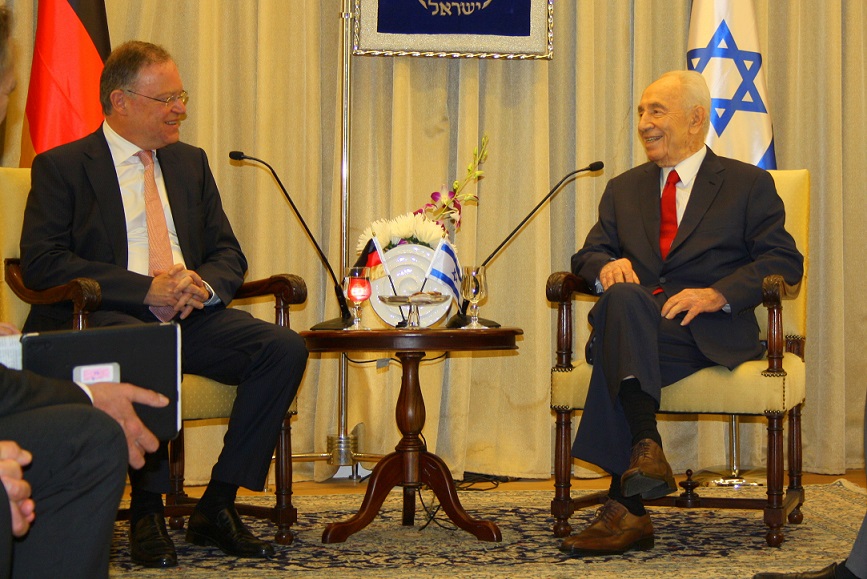President of the German federal assembly Stephan Weil in Israel and the Palestinian Territories
Germany is committed to the security of the State of Israel. No one should be surprised that, on this foundation, difficult topics are discussed as well.” That was the statement of Lower Saxony Premier Stephan Weil in his capacity as President of the Bundesrat (Federal Assembly) Germany’s second chamber of parliament, ahead of his four-day visit to Israel and the Palestinian Territories.
Weil has a reputation as a pragmatic and balanced politician with substantial experience on legal and financial territory. He found his political home with the Social Democrats as a young man, earned his spurs in municipal politics and, in February 2013, through the traditionally Social Democratic office of the Mayor of the regional capital Hanover, ascended to the post of State Premier of Lower Saxony.
Meeting with President Peres
Carrying on a long tradition, the Bundesrat president visited the Holy Land in the spring of 2014. One month after the latest round of peace talks between Israel and the Palestinians collapsed, the delegation met Israeli President Shimon Peres for an hour of talks. The delegation included the chairman of the Palestinian Community in Hanover, Yazid Shammout, who had been invited by the head of the Jewish Federation of Lower Saxony, Michael Fürst. Was it a signal aimed at the steadily escalating situation in the Middle East? “How many Palestinians live in Lower Saxony?” Peres asked. “Two thousand,” Shammout answered, seemingly surprising the Nobel Peace Prize winner.
The talks with the Israeli head of state focused mainly on the peace process launched by US Secretary of State John Kerry. Afterwards Weil invited the outgoing president to address a central ceremony on April 26, 2015, marking the 70th anniversary of the liberation of the Bergen-Belsen concentration camp. Peres, 90, pledged to have the offer examined.
When Bundesrat President met with Foreign Minister Avigdor Lieberman, the latter stressed the importance of Israel’s good relations with Germany. But Lieberman also expressed concern at the rise of racist and neo-Nazi parties. He appealed to the conservative parties of Europe to refuse any cooperation in the European Parliament with racist groups.
Deeply touched
Together with a group of five school kids from Lower Saxony, the state premier visited the Yad Vashem Holocaust Memorial. “The history of the Holocaust must be expanded at German schools, especially because there are so few eyewitnesses left who can share their authentic experiences,” Weil said. “That really touched me deeply,” he added after placing a wreath in memory of the six million Jews killed by the Nazis.
The visit’s second-to-last day took the Bundesrat President to further talks in the West Bank. In Ramallah Palestinian Prime Minister Rami Hamdallah met with the delegation for an hour. It was a historic day, in which the Palestinian unity government of Fatah and Hamas was to be sworn in. “If one has the will to make peace, it can succeed!” Hamdallah said according to a member of the delegation. This goal now seems practically unattainable.
Weil also met with Yasser Abed Rabbo, General Secretary of the Palestinian Liberation Organization. “Only one thing is certain in this region, and that’s that nothing is certain,” Rabbo acerbically remarked. When asked about his impressions, the State Premier said after his trip to Israel: “I went with little confidence and I return with deep concern and fear.” Unfortunately, his fears should prove true.

